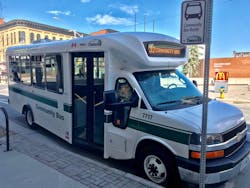Three Ontario regions see combined C$100 million in transit and infrastructure funding
The government of Canada, provincial government of Ontario and several municipalities are committing funding that will deliver improved accessibility and mobility through transit improvements.
The 43 projects, worth a combined C$100 million (US$73.37 million), will support healthier and more sustainable communities in Cornwall and Brockville, the Niagara Region and Peterborough.
“The projects announced today will provide better accessibility and improved service that will encourage greater use of public transit and allow residents to get to where they need to go safely and affordably. Investing in modern and integrated public transit systems is essential for building the healthier, low carbon communities of tomorrow. Our federal government will continue building stronger, sustainable infrastructure that will serve our community now and well into the future,” said Maryam Monsef, Minister for Women and Gender Equality and Rural Economic Development and Member of Parliament for Peterborough–Kawartha on behalf of Canada’s Minister of Infrastructure and Communities Catherine McKenna.
The federal funding commitments are through the Public Transit Infrastructure Stream (PTIS) of the Investing in Canada infrastructure plan. The plan will see the investment of more than C$180 billion in public transit projects, green infrastructure, social infrastructure and other initiatives during a 12-year timeframe.
Cornwall and Brockville
Cornwall and Brockville will see a total of C$12.41 million (US$9.11 million) invested in six projects, including more than C$5.1 million (US$3.74 million) from the government of Canada, more than C$4.1 million (US$3.01 million) from the province of Ontario, C$3 million (US$2.2 million) from the city of Cornwall and C$210,076 (US$154,138) from the city of Brockville.
Brockville Transit will see replacement of five of its buses with commercial minibuses equipped with accessible lifts. The buses will be replaced between 2021 and 2027 and will have automated stop announcement systems, fare counting aids and improved rider metric collection devices, allowing for better safety, accessibility and route planning
Cornwall will benefit from five projects including the installation of 10 new bus shelters and 60 fully accessible bus stops, and the replacement of 12 conventional buses and eight paratransit buses. The installation of 90 surveillance cameras, 15 new passenger counters and 26 electronic fare-boxes will enhance the passenger experience and provide better security to the public.
“We are always grateful for investments in our public transit infrastructure. Our community relies on Cornwall Transit – and this was never more apparent than during the COVID-19 pandemic, during which our buses connected residents with essential work and services. The city of Cornwall welcomes the opportunity to further invest in our transit system, and especially in infrastructure that will make transit more accessible, safer and more efficient,” said Cornwall Mayor Bernadette Clement.
Niagara Region
Niagara Region will see a total of C$78 million (US$57.23 million) invested in 31 projects including C$31 million (US$22.75 million) from the government of Canada, $26 million (US$19.08 million) from Ontario and C$21 million (US$15.41 million) from local municipalities.
“Today, we move another significant step closer to the completion of 31 new projects that will be game changers for the city of Niagara Falls and the Regional Municipality of Niagara. These investments will improve capacity, reliability and accessibility of local public transit infrastructure for the people of Niagara, including passengers who require specialized care,” said Sam Oosterhoff, Member of Provincial Parliament for Niagara West.
In addition to Niagara Falls and the Regional Municipality of Niagara, Fort Erie, Port Colborne, St. Catharines and Welland will see infrastructure improvements including those to transit routes and infrastructure, such as new buses, renovations to bus shelters, as well as new surveillance systems to ensure passenger safety. New fare payment technology will enable customers to use one method of contactless payment to access all of the transit systems across Niagara Region.
In Niagara Falls, the construction of a multi-modal hub on Bridge Street will increase access to local transit and transportation alternatives for residents using the GO regional transit system and help keep pedestrians safe in a traffic-centric location.
In St. Catharines, 21 new buses and four new paratransit vehicles will add capacity to the existing bus fleet, encouraging more residents to choose public transit by providing them with more frequent and accessible bus service.
Peterborough
Peterborough will see a total investment of C$9.5 million (US$6.97 million) in six projects to purchase new buses and vans, as well as refurbished buses. The city says the buses will increase the capacity and reliability of the fleet and improve the quality of service for passengers. Four of the six projects include new or upgraded accessible vehicles, such as buses and special access vans. The federal government is contributing C$5.8 million (US$4.26 million), the province is providing $4.76 million (US$3.49 million), with the city and county of Peterborough contributing the balance.
“We are grateful for the infrastructure investments made by the federal and provincial governments in Peterborough. This funding will help us provide more sustainable and accessible transit for residents and improve access to affordable transportation in our community,” said Peterborough Mayor Diane Therrien.
About the Author

Mischa Wanek-Libman
Group Editorial Director
Mischa Wanek-Libman is director of communications with Transdev North America. She has more than 20 years of experience working in the transportation industry covering construction projects, engineering challenges, transit and rail operations and best practices.
Wanek-Libman has held top editorial positions at freight rail and public transportation business-to-business publications including as editor-in-chief and editorial director of Mass Transit from 2018-2024. She has been recognized for editorial excellence through her individual work, as well as for collaborative content.
She is an active member of the American Public Transportation Association's Marketing and Communications Committee and served 14 years as a Board Observer on the National Railroad Construction and Maintenance Association (NRC) Board of Directors.
She is a graduate of Drake University in Des Moines, Iowa, where she earned a Bachelor of Arts degree in Journalism and Mass Communication.
